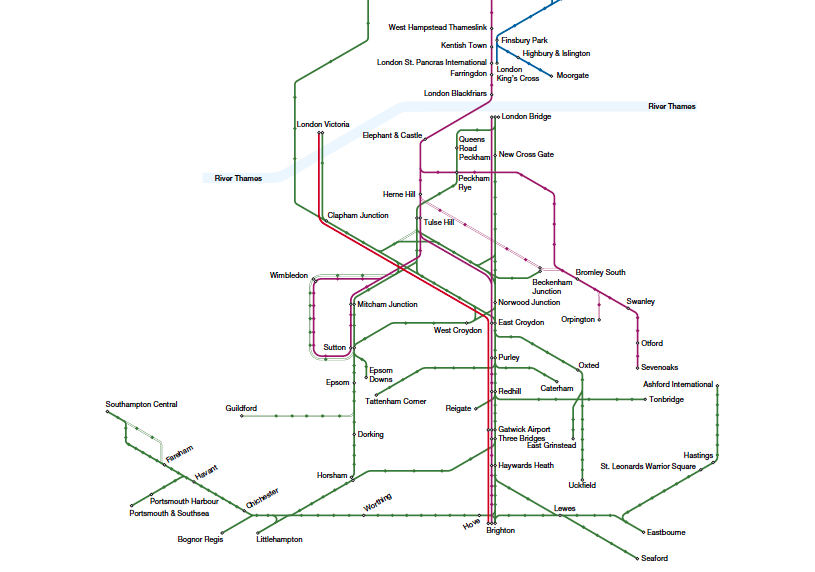Delayed, cancelled and painfully expensive: three years of misery on the London-Brighton line
The £20 one-way Gatwick Express fared even worse that the rest of the franchise

Your support helps us to tell the story
From reproductive rights to climate change to Big Tech, The Independent is on the ground when the story is developing. Whether it's investigating the financials of Elon Musk's pro-Trump PAC or producing our latest documentary, 'The A Word', which shines a light on the American women fighting for reproductive rights, we know how important it is to parse out the facts from the messaging.
At such a critical moment in US history, we need reporters on the ground. Your donation allows us to keep sending journalists to speak to both sides of the story.
The Independent is trusted by Americans across the entire political spectrum. And unlike many other quality news outlets, we choose not to lock Americans out of our reporting and analysis with paywalls. We believe quality journalism should be available to everyone, paid for by those who can afford it.
Your support makes all the difference.Travellers who depend on the Thameslink, Southern and Great Northern rail franchise to get to work, school or hospital appointments will not be surprised that it has most delayed and disrupted trains in Britain — three times worse than average on the rest of the network.
The troubled franchise is the biggest in Britain. It covers almost one in five of the trains for which the Department for Transport (DfT) is responsible. Routes extend out as far as Southampton, Hastings, King’s Lynn and Milton Keynes. But the heaviest-used sections are on Southern, whose core line from Brighton via Gatwick airport to London Victoria and London Bridge, and Thameslink from Brighton and Gatwick through the City of London to St Pancras, Luton and Bedford. These lines constitute four-fifths of operations, with around three-quarter of a million journeys each day.
Travellers have spent £3.6bn on tickets over the past three years, of which around one-fifth has been pocketed by the DfT. Govia Thameslink Railway (GTR), the franchise holder, has so far lost over £5m on the troubled contract. But the National Audit Office (NAO) report on the franchise finds it has “not delivered value for money”.
The scale of disruption in the watchdog’s report are staggering. On average commuters have found one in 13 trains either cancelled or so late (over half-an-hour) that it might well have been axed.
Many cancellations were caused by staff shortage — partly because of strikes over the expansion of Driver Only Operation (DOO) on the Southern network. The DfT had specified the extension of DOO, but the report says it failed to “fully evaluate the possible effects on passengers of different scenarios of industrial action before awarding the contract”.
During the strikes leading up to Christmas 2016, barely three out of five trains arrived at their destination within five minutes of their scheduled time. The dispute is now in its third calendar year; the latest stoppage in this long and bitter conflict took place on Monday.
But even if the franchise had enjoyed harmonious industrial relations, it would have been fraught with staffing issues: GTR had begun with insufficient drivers to operate the published timetable. Before awarding the contract, says the report, the DfT failed to “seek sufficient assurance that Govia Thameslink would have enough train drivers when it took on the franchise”.
A massive infrastructure project at London Bridge inevitably put pressure on the operation — but it was made much worse by Southern planning an impossibly ambitious schedule. Even if everything had gone right all day, the timetable was unachievable.
The report adds: “The Department and Network Rail did not have a good understanding of the underlying condition of the existing network at the point when the Department set the requirements of the franchise.”
If there is any comfort for the very long-suffering commuters, it is that occasional travellers from London Victoria to Gatwick airport fared even worse than the rest of the franchise. More than a quarter of Gatwick Express trains have been more than five minutes late over the past three years. And that is despite a one-way fare for the 28-mile journey of £19.90, more than the price of the plane ticket for some.
“When designing future franchise contracts,” the NAO concludes, “the Department should give more consideration to the potential impact on passengers of its decisions.”
Commuters will be astonished that such a thing even needs to be said.
Join our commenting forum
Join thought-provoking conversations, follow other Independent readers and see their replies
Comments